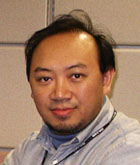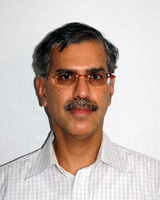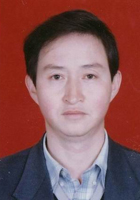| Talk title: Designing a Smart City with IT and AI |
Talk Abstract:Information Technology (IT) can change the world in a very innovative way if we properly design a desirable society. "Smart City" is a slogan toward designing such a city. Yes, a good design is essential. A Smart City has many sensors to recognize its situation and computer networks acts as nerves and brains of the city. Learning and planning mechanisms developed by Artificial Intelligence (AI) research are then employed to make smart decisions on the city's activities, such as power supply, transportation, production, agriculture and so on.
| -----------------------------------------------------------------------------------------------------------------------------
|
 |
| Chun-Nan Hsu, 研究員, 中央研究院資訊科學研究所 |
| |
| Talk title: Text Mining from Biomedical Literature |
| |
| Dr. Chun-Nan Hsu is a research fellow at the Institute of Information Science, Academia Sinica, Taiwan and a computer scientist at the Information Sciences Institute (ISI) of the University of Southern California (USC), CA, USA. He has more than 14 years of academic research experience in the fields of Artificial Intelligence and Bioinformatics. His doctoral thesis research involved data mining, machine learning and information integration. In 1996, before he passed his doctoral oral exam, he was offered a position as Assistant Professor at the Department of Computer Science and Engineering at Arizona State University. He taught there for two years before returned to Taiwan in 1998. In 2005, he was awarded a grant to lead the IT team in the national bioinformatics core facility in the National Research Program for Genomic Medicine, where he applied innovative machine learning and information integration technologies to solve research problems in genomic medicine. His team developed widely used tools for functional analysis of gene variations, biological text mining, and cellular image analysis. At USC/ISI, he has been involved in genome-wide association study projects where he is working on text and data mining. |
| |
| ----------------------------------------------------------------------------------------------------------------------------- |
| |
 |
| Prof. Goutam Chakraborty, Iwate Prefectural University |
| |
| Title: Machine Learning Approach for Relevant Gene Selection from DNA Microarray Data for Disease Classification |
| |
Talk Abstract:Using microarray technology we can compare gene-expression levels of several thousand genes from different sample cells, say from a diseased cell and a healthy one, or from cancer cells of different types. Simultaneous measurements of tens of thousands of mRNAs can be performed. Depending on sample sources, important investigations like disease progress, exact diagnosis, drug response, etc., can be done by analyzing DNA microarray data. When one sample source is a healthy cell, and the other a cancerous one, it is possible to identify changes in particular gene expression due to the disease. In case of disease like cancer, it is possible to identify the exact type of cancer and thereby ensure proper treatment. From samples taken at different time, the progress of the disease could be predicted.
The aim of this work is to identify as small a number of genes as possible, which as a set of features could classify the target disease with highest accuracy, i.e., even if we add more gene-expression data (include expression data of other genes) the classification accuracy will not improve. We are looking for a model with a minimum number of inputs, which when classifying new tissues will give accurate results. Our aim is gene-selection, not just gene-clustering with a motivation to provide an insight into patterns and gene interactions available within the microarray data. Of course, our gene-selection method too is a helpful tool to identify correlation among different genes, though (due to lack of our domain knowledge) we do not emphasize on those aspects.
Gene expression values are viewed as elements of feature vector, and microarray expressions an enormously high dimensional data. Expression values of most of the genes are irrelevant to the target investigation. Moreover, available samples are a few, in tens to a maximum of around hundred. This problem of classification of a few samples in a space of thousands of features, where many features are irrelevant, is a difficult task. In this talk, we present a hierarchical way of gene selection, and compare results with other recent works.
| ----------------------------------------------------------------------------------------------------------------------------- |
| |
 |
| Prof. Xiaohong Jiang, Future University Hakodate, Japan. |
| |
Talk title: Network Information Theory for MANETs
| |
Talk Abstract:
Mobile ad hoc network (MANET), a flexible peer-to-peer networking technology without any pre-existing infrastructure, holds great promises for applications like emergency and battlefield networks, metropolitan mesh networks, and sensor networks. This talk focuses on our recent work on Network Information Theory for MANETs, in particular the MANET capacity theory. We will discuss how the capacity and delay of MANETs scale with the routing algorithms, the number of network nodes, the power control and also network traffic patterns.
|
Short CV of speaker:
Dr.Xiaohong Jiang received his B.S., M.S. and Ph.D degrees all from Xidian University, China. He is currently a full professor of Future University Hakodate, Japan. Dr.Jiang was an Associate professor of Tohoku University, Japan, from Feb.2005 to Mar.2010, an assistant professor in Japan Advanced Institute of Science and Technology (JAIST), from Oct.2001 to Jan.2005. Dr. Jiang was a JSPS research fellow at JAIST from Oct.1999-Oct. 2001. He was a research associate in the University of Edinburgh from Mar.1999-Oct.1999. Dr. Jiang’s research interests include computer communications networks, mainly wireless networks, optical networks, etc. He has published over 190 technical papers at premium international journals and conferences, which include over 20 papers published in IEEE journals like IEEE/ACM Transactions on Networking, IEEE Journal of Selected Areas on Communications, etc. Dr. Jiang was the winner of the Best Paper Award and Outstanding Paper Award of IEEE WCNC 2008, IEEE ICC 2005- Optical Networking Symposium, and IEEE/IEICE HPSR 2002. He is a Senior Member of IEEE. |
| |
|
|
|
|
|

